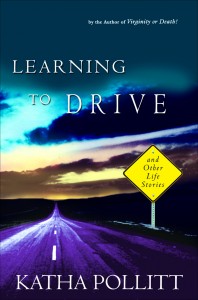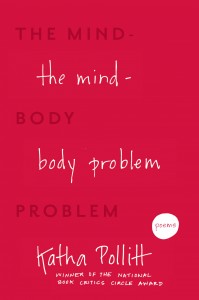The Poetry of Politics
Last year, Katha Pollitt, the longtime columnist at The Nation, received the American Sociological Association’s award for Excellence in the Reporting of Social Issues. One of the country’s leading political commentators, Pollitt is the author of seven books, including two volumes of poetry. She is currently writing a book about the abortion conflict in the United States. Carole Joffe is a professor at the Bixby Center for Global Reproductive Health at the University of California, San Francisco and the author of Dispatches from the Abortion Wars: The Costs of Fanaticism to Doctors, Patients and the Rest of Us. She regularly blogs on reproductive politics at RHRealitycheck.org, Huffington Post, and elsewhere.
Carole Joffe: Tell us about the pathway that led you to The Nation, where you are, as the American Sociological Association (ASA) award statement put it, “a serious gadfly on the social consciousness of the public!”
Katha Pollitt: Sometimes I feel my career began in the Middle Ages. The other night I was at a book event for about 20 feminist journalists, where I was only one of two people over 40. I was the only one whose career began in paper media and basically stayed there. I started writing book reviews for the New York Times Book Review and elsewhere soon after I graduated from college, and, along with my poetry publications, that led me to The Nation, where I was the literary editor in the early 1980s. I’ve stayed there ever since. Before I began my column, I was an associate editor for the front section.

CJ: Speak about your relationship to sociology and the social sciences in general. In your writings, you make periodic use of social science research that you find relevant—but at the same time, you do not hesitate to criticize academic writing you find irrelevant or inaccessible to the general reader. In particular, what is your overall assessment of academic feminism and how useful this field has been to women in the “real world”?
KP: Academic writing is often turgid and jargon-ridden. Sociology is far from the worst offender! At least sociology, like anthropology, is often about real people the author has often actually spent time with. A great ethnographic work is like a wonderful novel: what is it like to be these people and live under those conditions? How does the world look to them? What has made them what they are? What are the concrete effects of social policy? At the ASA, a man came up to me after my little talk where I had praised sociology and said, “The kind of sociology you like has very little status in the profession. These days it’s all about numbers.”
All the social sciences seem to have economics envy these days, don’t they? Feminist scholarship has revolutionized every field: history, literary studies, biography, psychology, medicine, law, biology, theology, philosophy and sociology too. Of course, not every male scholar realizes that! A lot of them trundle along as if nothing has changed.

CJ: A consistent theme in your writing is the status of the feminist movement, both in the United States and elsewhere. What is your sense of contemporary feminism and its ability to address the longstanding generational and racial tensions?
KP: I actually think the feminist movement is coming back from the doldrums. Thanks to the Internet, young feminists are finding each other: there are dozens of websites, like Feministing, Feministe, and Jezebel. There’s quite a bit of activism, too, especially around sexual violence, reproductive rights, body issues and misogyny in pop culture. Today’s young feminism has an edgy, sexy, sarcastic vibe—think of Slut-walk [covered in this issue of Contexts].
That tone puts off some older women, and some younger women too, but it also draws in women who thought of feminism as dowdy and pleasure-denying. Of course the Republicans have helped a lot here. When candidates talk about legitimate rape and pregnancy from rape as part of God’s plan, when Rush Limbaugh and his ditto heads call women sluts for using birth control, that gets women’s attention.
CJ: Another major focus of your writing is abortion, and you have written (brilliantly, in my view) about the abortion rights movement, the anti-abortion movement and the predicament of abortion providers and patients alike. What have you tried to accomplish in your new book on the topic?
KP: I think the pro-choice movement has been much too defensive for too long. We talk endlessly about the hard cases—rape, incest, life and health of the mother— and it’s important to remind people about them, because anti-choicers want to ban those abortions too. At the same time, those represent maybe 10 percent of the more than 1 million abortions that take place every year. My thesis in a nutshell: we need to talk about abortion as a normal part of reproductive life, and access to it as a positive social good. It’s a good thing that women don’t drop out of school or work because a condom broke or they forgot their pill; that they plan and time their pregnancies; that they stop having kids when they’ve had as many as they feel they can raise well. It’s outrageous that women are expected to be at the mercy of a stray sperm.
Similarly, we need to complicate the way we talk about the abortion decision. Sometimes it’s difficult, sure, but a lot of the time it’s simple. Women shouldn’t be made to feel guilty if they don’t agonize over whether they should have a baby just because they happened to get pregnant.
CJ: Give us your reflections on the 2012 elections, especially with respect to the issues that most preoccupy you in your writing, such as reproductive politics, and the “war on women” more generally. Do you agree with those writers, such as Maureen Dowd, who, in response to the Democratic victories, have proclaimed that “the cultural wars are over”?
KP: Don’t you hate it that what we call “the culture wars” is actually a struggle over social justice, civil rights and civil liberties? It’s like the way news about breast cancer or domestic violence goes in the “style” section, just because it’s about women. Birth control is not some frill. It is as much health care as any other medicine or medical device—a lot more important than some of them! Abortion rights and access are totally bound up with women’s equality, including women’s economic equality, which is not a cultural issue. Gay marriage is about equality for sexual minorities, about social inclusion, and about redefining marriage away from the old patriarchal/religious model. What music to play at the gay wedding—that’s a cultural issue.
The 2012 election was a real rebuke to the Tea Party ultra-right and to the flagrant misogyny of the Republican “war on women.” But let’s not go overboard: Claire McCaskill [of Missouri] might well have lost to a more circumspect anti-choice right-winger than Todd “legitimate rape” Akin; she might even have lost had he not made that much-publicized unfortunate remark. The same was true in conservative Indiana, where a Democrat given little chance of winning took the senate seat after Republican Richard Mourdock said pregnancy from rape was part of God’s plan. For the presidential contest, the gender gap was the biggest ever. But let’s not forget Republicans still control the House and enough Senate seats to filibuster and otherwise block much legislation. Just the other day Senate Republicans, led by Rick Santorum, blocked confirmation of the UN treaty on disability rights on the non-sensical grounds that it might someday prevent home schooling.
On abortion rights, as you recently wrote, much of the action is in the states. Anti-choicers have done a very good job of making abortion hard to get in much of the South and Midwest: in five states there is only one abortion clinic. Republicans did well at the state level in 2012. They now control 24 state legislatures and 30 governorships. Where they control both, they can really go to town.
In the long run, I think liberal social policies will win. Young people are less racist, less religious, more gay-tolerant, and even, according to some polls, more pro-choice—although not as much as you would expect, given that it is mostly young women who have abortions and young men who impregnate them. The country is becoming more diverse: a party that caters to older white Christian men and their wives may do fine in Wyoming, but it’s going to be shut out of national power. Of course the Republicans know that—they are having battle royales behind the scenes as they try to figure out how they let victory slip from their grasp in 2012. They will surely try to jigger their image and modify their policies around the edges to appeal to Latinos, single women, young people and that famous 47 percent of the nation that relies on government programs to survive. Not black people though—I think they’ve given up on them. The problem is, the Republican base—rightwing evangelicals and fundamentalists, anti-choicers, extreme right-wingers, and xenophobes—may not let them move in a more centrist direction.
CJ: Finally, can you speak about the range of reactions you get from readers? As was evident from your appearances in two sessions at the ASA, you clearly have a very devoted group of followers—one might even say “groupies”—but obviously not all your mail is positive. In one of your books, you mention the amount of negative responses you got to an essay in which you explained your hesitation to fly the American flag after 9/11. What else has provoked your readers besides that essay?
KP: It’s very sad. These days I don’t get a lot of hate mail. What am I doing wrong?
